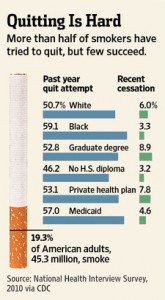This being the month of the Great American Smokeout, I’m focused on tobacco cessation.
The bottom line seems to be this: the public supports tobacco-free spaces. Employers are more routinely supporting tougher tactics. People want to quit. Governments are trying to figure out where to step in. And tobacco companies still have a tight hold on anti-tobacco efforts.
The numbers of tobacco users has flatlined, but people who are using tobacco aren’t able to quit. They quit and relapse. Even those with a greater chance of staying tobacco-free, have a very low success rate.
Basically, we’re semi-stuck.
I’d like to start some discussion about how you’re approaching tobacco cessation:
- If you’re an employer: what support do you offer employees? Have you gone tobacco-free? Do you have a tobacco surcharge?
- If you’re a tobacco user: Have you tried to quit? How do you feel about tobacco surcharges?
- If you’re not a tobacco user: how do you feel about tobacco surcharges?
 You can go to my website where this post originated and answer there in the comments on this post — or, add a comment here at TLNT. I’ve also set up a poll about the perceived fairness of tobacco surcharges.
You can go to my website where this post originated and answer there in the comments on this post — or, add a comment here at TLNT. I’ve also set up a poll about the perceived fairness of tobacco surcharges.
To get you thinking a little more about this topic, here are some recent stories that dug into the topic.
The smokers surcharge
This New York Times article reviews the ramp-up in penalties and surcharges for tobacco users:
Many other companies charge smokers a smaller, flat amount, and have kept any financial penalties under the 20 percent threshold set by the federal rules, according to benefits experts. Target, a Wal-Mart competitor, does not charge smokers more for insurance, while Home Depot charges a smoker $20 a month. PepsiCo requires smokers to pay $600 a year more than nonsmokers unless they complete an antismoking program.”
High failure rate for smokers who try to quit
This Wall Street Journal article offers statistics on who’s trying to quit and how successful they’ve been:
Of the nearly 69% of adult smokers who wanted to quit in 2010, more than half tried but only 6.2% succeeded, according to the Centers for Disease Control and Prevention. Those who try can double or triple their chances with counseling or medicine, but most of those who tried to quit last year didn’t use either. Nor did they receive advice to quit from a doctor.”
Needing an extra push to help them quit
Companies want employees to quit tobacco. The majority of people who smoke also want to quit. So, what’s the problem? This article suggests two possible answers: the lack of help from primary health care providers and the use of evidence-based programs.
68.8% of current cigarette smokers said they would like to completely stop smoking, and 52.4% had tried to quit smoking in the past year. However, 68.3% of the smokers who tried to quit did so without using evidence-based cessation counseling or medications, and only 48.3% of those who had visited a health-care provider in the past year reported receiving advice to quit smoking.”
Should we ban cigarettes?
A professor of bioethics at Princeton University asks on CNN whether the only way out is to ban cigarettes:
For those who recognize the state’s right to ban recreational drugs like marijuana and ecstasy, a ban on cigarettes should be easy to accept. Tobacco kills far more people than these drugs.”
An over-the-counter smoking cessation program
Healthways and GlaxoSmithKline have teamed up to offer a tobacco cessation product via Walmart:
Through this program, Healthways will provide its online smoking cessation behavioral support solution, QuitNet, representing Healthways first entry into the OTC consumer market and providing a new distribution channel for a solution that has already served over 1 million people through Healthways’ work with health plans, employers and public health departments.”
Come see Fran Melmed speak on “The Second-Generation Workplace Wellness Program” at the TLNT Transform conference in Austin, TX Feb. 26-28, 2012. Click here for more information on attending this event.
This was originally published on Fran Melmed’s Free-Range Communication blog.
